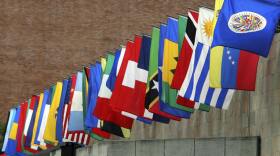
Shereen Marisol Meraji
Shereen Marisol Meraji is the co-host and senior producer of NPR's Code Switch podcast. She didn't grow up listening to public radio in the back seat of her parent's car. She grew up in a Puerto Rican and Iranian home where no one spoke in hushed tones, and where the rhythms and cadences of life inspired her story pitches and storytelling style. She's an award-winning journalist and founding member of the pre-eminent podcast about race and identity in America, NPR's Code Switch. When she's not telling stories that help us better understand the people we share this planet with, she's dancing salsa, baking brownies or kicking around a soccer ball.
-
On this day 50 years ago, the band Queen released its first album and introduced the world to the singular voice of Freddie Mercury. (Note: Story first aired on Morning Edition on Aug. 30, 2010.)
-
For NPR's Life Kit, Shereen Marisol Meeraji speaks with Jon Kabat-Zinn, the founder of mindfulness-based stress reduction, about how to manage stress, uncertainty and difficulties using mindfulness.
-
For NPR's Life Kit, Shereen Marisol Meraji speaks with Trisha Hersey, author of "Rest Is Resistance," about fighting against the feeling that our productivity equates to our worth.
-
Have you ever tried to learn another language? If so, you know how tough it can be. Now imagine trying to learn another language everyone already expects you to know.
-
After the attacks on the World Trade Center on September 11, 2001, the word "terrorism" was everywhere. It's a powerful term that's had lasting implications for communities around the world.
-
Latino voters helped to shape the presidential race in different ways. For the first time, Latinos became the second-biggest voting demographic after white people, and that has major implications.
-
New research shows "Latinx" hasn't really caught on among U.S. adults in that heritage group: While one in four have heard of the term, only 3% use it.
-
Are self-help books actually helpful? That's the question Kristen Meinzer sought to answer in her upcoming book, How to Be Fine: What We Learned From Living by the Rules Of 50 Self-Help Books.
-
By the 1980s, fewer than 50 Hawaiians under age 18 could speak their language. A handful of second-language speakers took it upon themselves to start a school where everything is taught in Hawaiian.
-
We talked to Angela Saini, author of the new book Superior: The Return of Race Science, about how race isn't real (but you know ... still is) and how race science crept its way into the 21st century.





